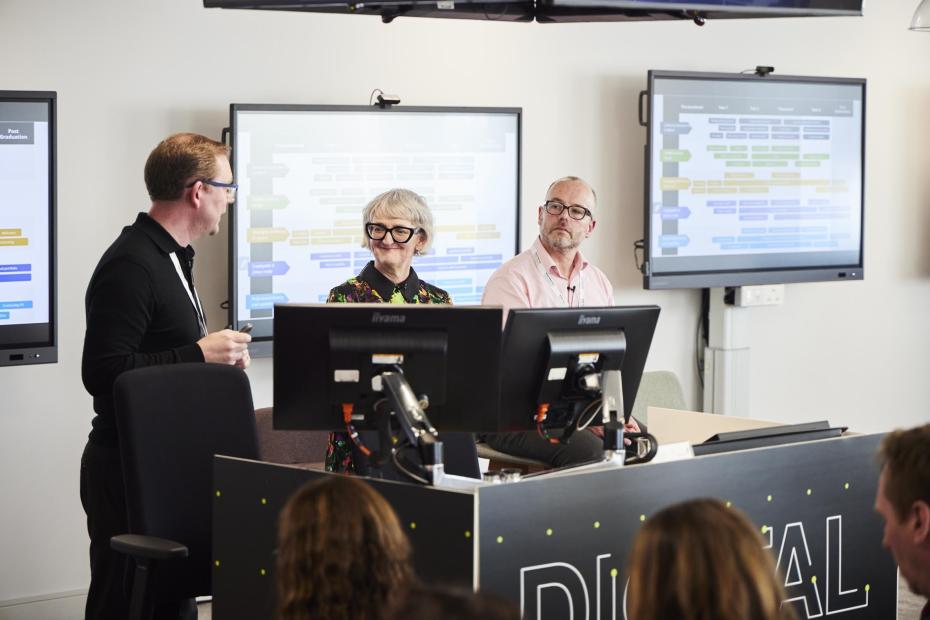Giving students paid opportunities to co-design online learning content offers multiple benefits for both learners and institutions, including enhancing learning experiences, reducing academic workload for staff and addressing the awarding gap. An initiative at the University of Derby offered paid employment to current students as learning design assistants during which they contributed to the development and enhancement of online course materials. This approach not only offers students academically relevant employment, it also aims to make online learning environments more inclusive and effective for a diverse student population.
- Spotlight collection: the business of online education
- Learning designer may be the best job you’ve never heard of
- Resource collection: working with students to co-create their education
Here‘s what we have learned so far.
What we ask our temporary learning design assistants to do
Two posts for temporary learning design assistants were advertised to students through the university’s student employment agency during the 2023/24 academic year. The successful applicants were partially responsible for, among other duties:
- generating alternative image text to enhance the accessibility of online content
- ensuring multimedia resources included suitable and sensical captions
- developing activities that promoted active application and reflection on learning
- proposing multimedia elements to add value to and enhance engagement in content
- ensuring the quality of online content met established university standards.
The learning design assistants completed an eight-week working contract, during which they received professional mentorship from a senior manager and worked collaboratively alongside professional educational developers, media producers and academics. Their role provided them with the opportunity to add value to the more passive sections of online content provision, including written (case studies, reflections), visual (images, short videos) and audio (podcasts, interviews). In practice, once live, this content is supplemented through active discussion boards and interactive live sessions with academics and experts at multiple points during each module.
How paid work experience impacts students and staff
These short-term contracts provided paid opportunities to students in applied and academically relevant roles, while reducing administratively taxing roles for the academic team. Both learning design assistants recruited were postgraduate students who intended to pursue academic careers. As a result of the professional experience gained in the role, one has already parlayed their experience into a part-time teaching and learning role at another higher education institution, undertaken in addition to their ongoing studies. The other has started doctoral study on the topic of teaching and learning practices in higher education.
Such opportunities may also have the capacity to broadly benefit the awarding gap as well. Both learning design assistants are increasingly leveraging their own experiences in their support of academic practitioners, framing their suggestions and proposed quality enhancements in terms of their own lived experience of study and proposing amendments that target the comprehensibility, accessibility and intelligibility of academic materials to an audience of their fellow students.
Indeed, debate leads us to recognise that if information is presented to students in a manner that contributes to ambiguity, cultural misalignment or assessment-related confusion, this could reinforce the awarding gap. As such, involving students before the point at which the content is released to the larger student body can help identify inaccessible material, and areas where further elaboration or examples could benefit students’ engagement with the material. Ensuring that current and culturally relevant explanations are offered when covering material that might be seen as complex or difficult to access can scaffold meaningful discussions for more learners.
This approach provided an opportunity for instantaneous feedback in a collaborative manner to academic educators before they disseminated the content more broadly to the student body; typically – post-release – content would remain the same until the following academic year. Explicit consultation with student co-creators, who received professional support and remuneration, helped break down barriers that might prevent such students approaching the academic team about their misunderstandings for fear of stigma around not understanding the material. Likewise, with academics made aware of particularly taxing material, they were able to shape their live discussion sessions, or their provision of ad hoc informative material, around these topics to ensure the successful navigation of pinch points within their modules.
An initial pilot of this initiative has been completed, and a full evaluation of its impact on the quality of the teaching materials as well as the professional and personal development opportunities of the students employed within the role is being developed and disseminated. Although this initiative does not negate the need for continual feedback, module development and material refreshment, it does offer a potential strategy for ensuring that content is co-created in a more accessible manner, while providing key opportunities for student development in a novel and easy-to-implement manner.
Dean Fido is associate professor of forensic psychology and Gary F. Fisher is learning design and online practice manager, both at the University of Derby.
If you’d like advice and insight from academics and university staff delivered direct to your inbox each week, sign up for the Campus newsletter.




comment